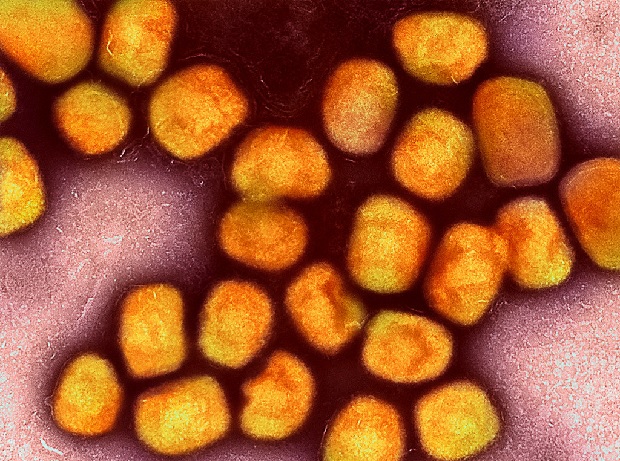According to recent studies, monkeypox is evolving very quickly in Europe and North America. The research demonstrates how little is known about the virus.
According to a study conducted by Portuguese experts and published in the journal Nature Medicine, the monkeypox virus that is spreading throughout the US, Europe, and the UK is evolving shockingly quickly. The research provides the most thorough examination to date of the virus's genomic make-up.
Scientists sequence virus genomes because the genome is the virus's playbook. The genome is an organism's genetic make-up, and in the case of a virus, it provides information on the virus's characteristics, functions, and potential routes of transmission.
Since 2018, the monkeypox has changed 50 times
The researchers compared the genomes of the virus that had infected 15 individuals with monkeypox as part of the study.
The patients had distinct strains of monkeypox, which the researchers were able to link to an earlier outbreak of the virus that occurred in 2018–2019 in the United Kingdom, Israel, and Singapore and had its origins in Nigeria.
Additionally, the testing revealed that the virus has undergone 50 mutations during the previous outbreak in 2018 – up to 12 times more than they had anticipated.
According to study author Joao Paulo Gomes, a researcher at Portugal's National Health Institute, "this evidence radically defies what is known about the mutation rate of monkeypox."
Less people die from monkeypox in West Africa
Monkeypox is a disease that we know a little bit about, and this new genome sequencing has allowed researchers to better comprehend the present outbreak.
First off, the virus strain causing the present outbreak is evolving extremely quickly.
Second, at a significant superspreader event, a single case that infected others is likely how the outbreak began.
The strain belongs to the West African clade of monkeypox, which is frequently found in Sierra Leone and western Cameroon and has a fatality rate of less than 1%.
A clade is characterized as a collection of species with a shared genetic progenitor or lineage.
Another widespread branch of monkeypox, called "Central African," is more prevalent in the Congo basin and has fatality rates as high as 10%.

It is challenging to monitor the incubation period for monkeypox
Additionally, there is a great deal more we don't know about the present outbreak of monkeypox.
Its movement is difficult to follow due to its lengthy incubation phase, which lasts between five and 21 days.
The "index case"—the initial instance of the disease—was a person who arrived in the United States from Nigeria in early May, according to the World Health Organization.
However, the researchers in Portugal contest that assertion, claiming that in late April, there were confirmed instances in both Portugal and the United Kingdom.
If the Portuguese researchers are right, we know less about the present outbreak than we thought we did, including how it has changed and what it is likely to do next.
So where did the outbreak of monkeypox begin?
In their research report, the experts state that it is most likely that the virus was imported from a nation where monkeypox is an endemic problem, such as Nigeria, but they add that they cannot completely rule out other scenarios.
They assert that it is also plausible, for instance, that following the 2018–2019 outbreak, the virus might have quietly spread through people and/or other animals in nonendemic nations like the UK or Singapore.
Furthermore, they claim that it's not apparent if the altered form is any worse than the original.
In response to the publication, Hugh Adler, a researcher at the Liverpool School of Tropical Medicine, stated that "the authors disclose an unexpectedly high number of mutations in the virus, but their consequences for illness severity or transmissibility are unclear." He was not a part of the study.
Adler, who has dealt with monkeypox patients in the UK during prior outbreaks, stated that "we have not identified any change in the severity of clinical disease in individuals diagnosed in the present outbreak."
Research into monkeypox is "still in its infancy."
A zoonotic virus with double-stranded DNA causes monkeypox. RNA viruses, like the one that causes COVID-19, change faster than DNA viruses.
But generally speaking, we know very little about monkeypox. For instance, the researchers in Portugal only reference one other study that looked at the genomes of the virus.
The genomic analysis of the virus, according to Adler, is "still in its infancy."
We know what the genes are because we have the genome sequence, according to Adler. But compared to many of the other large viruses we are aware of, relatively little research has been done to truly understand what they do and the ramifications for evolution if the genes change.
Adler praised the "fascinating" new insights into the biology of monkeypox that Gomes' team's research in Portugal had offered, but he also pointed out that it appeared as though the study had been made possible solely by the virus's present spread in high-income nations.
As always, Adler added, "We might already have a stronger knowledge foundation if the global community had dedicated these same research resources to monkeypox epidemics in Africa.
The first incidence of monkeypox in a human was reported in a young infant in the Democratic Republic of the Congo in 1970. Monkeypox was originally identified in a monkey in 1958.
